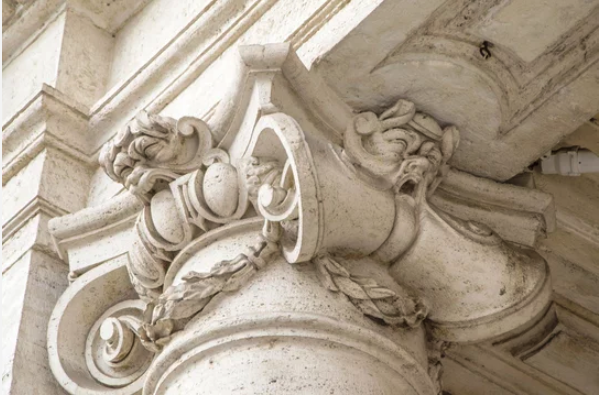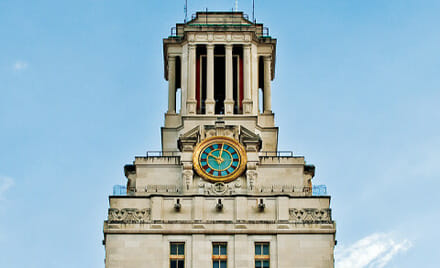Clements Center Undergraduate Fellow Ruth Folmar provides insight on Saudi Arabia’s Mohammed bin Salman in op-ed
Ruth Folmar | Jul 09, 2018
Ruth Folmar is a rising Junior studying Plan II, History and Arabic Language. She has experience interning at a Jordanian NGO and congressional offices and aspires to work in the US defense or intelligence sector upon graduating from UT. Read her full article below:
Mohammed Bin Salman – A Wolf in Sheep’s Clothing or Leader of the Pack?
Who is “MBS”? Wily dictator, the “New Hope” of Saudi Arabia, or a mere political opportunist? His actions have been interpreted both as an open-minded emancipation of strictly enforced Saudi conservatism, as well as a dictator’s amassing his political authority. (In November 2017 he imprisoned eleven members of the royal family in a move that both cracked down on nepotistic corruption and further consolidated his own power.) MBS’ use of propaganda and amassing of power stand firmly against American values of democratic transparency, and yet, many of his initiatives have caused regional observers to pulsate with optimism. He has taken on Salafi conservatives with a vigor surpassing most of his fellow sheikhs in the Gulf. Bin Salman’s actions are decisive, though backed by the understanding that these wide-sweeping changes are not unreservedly welcomed among Saudi elite.
MBS’ most widely publicized reforms are in the realm of legal liberalization. During his short reign, he has reformed bankruptcy law, opened new movie cinemas, and even allowed women to drive to them! He’s also defanged the religious police and proposed breathtaking economic and immigration reforms. If Saudi can sustain some semblance of the rule of law while undergoing such expansive reforms, Bin Salman may catapult his kingdom into the position of diversified, global economic player, better positioned to collaborate with others.
He is undoubtedly changing the religious face of Saudi Arabia, calling for a pluralistic society governed by moderate Islam. At the Future Investment Initiative in Riyadh, he claimed: “we want to go back to what we were — the moderate Islam that is open to the world, open to all the religions.” His crackdown attitude against extremism is undeniable — “we will not waste years of our lives in dealing with extremist ideals, we will destroy them today.” Bin Salman is quickly becoming the emblem of moderate pluralism in the Gulf alongside the UAE — a radical shift from the platforms of his predecessors. Rather than siding with Salafism, religious police, and radical Islam, Saudi shifts from an Islamic theocracy to a state with a more palatable Muslim flavor. Bin Salman, at least in these public pronouncements, openly embraces the West’s opposition to Islamic extremism in the region. (Surely it’s not insignificant that MBS paid $450 million for Da Vinci’s portrait of Jesus Christ entitled Salvator Mundi — “Savior of the World”.)
MBS also zeroes in on economic development in the region. Take Neom, MBS’s $500 billion transnational economic zone, planned for northwest Saudi Arabia (bordering Egypt and Israel). This new city is planned to open the country up, putting Saudi at the center of technology, innovation, and economic activity in the region. Bin Salman is positioning Saudi to become a more serious contender in global trade by diversifying beyond oil alone. He knows that promoting freedom and liberalism in his country will come hand in hand with softened relationships with western powers and a better trade environment.
This is not the only change Saudi is making on the world stage. The Crown Prince is softening the country’s hardline stance towards some American allies — most notably, Israel. Thought rapprochement is far from certain, some tangible progress is being made. MBS has allowed Air India flights to be opened up between Riyadh and Tel Aviv, signaling the establishment of clear lines of communication between the two countries.
Of course, there is suspicion that all these reforms are essentially propaganda, skillful feints at true reform. And while the future has yet to reveal MBS’ real allegiance, the prominence and open liberality of a leader like Bin Salman bodes well for the relationship between Saudi and the US. Cultural change happens slowly, but we are seeing the beginnings of economic diversification, a greater emphasis on education, modernization, and increasing cultural openness — all spearheaded by a visionary leader from a new generation.
I recently flew into the Gulf and was seated next to a young Saudi woman. She gushed about all that Bin Salman is doing for the country, mentioning that younger people are crazy about his leadership and reforms — more than two-thirds of Saudi Arabia’s population is under 30. She also mentioned that they fear his removal by older, reactionary influences. Only time will tell. If Mohammed Bin Salman succeeds, the United States has much to look forward to in its relationship with Saudi Arabia. This is not to say that MBS is embracing a democratic, egalitarian, pluralistic system. But his posture signals developments to come. Fresh winds are blowing across the Arabian desert. Mohammed Bin Salman is championing an unprecedented reformist agenda.




